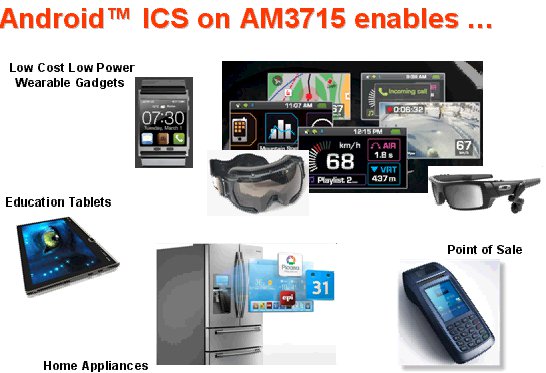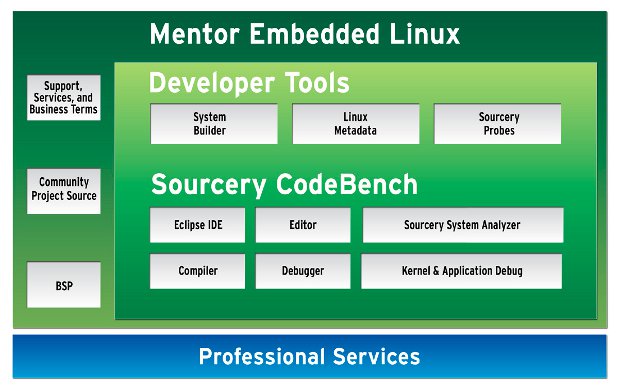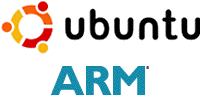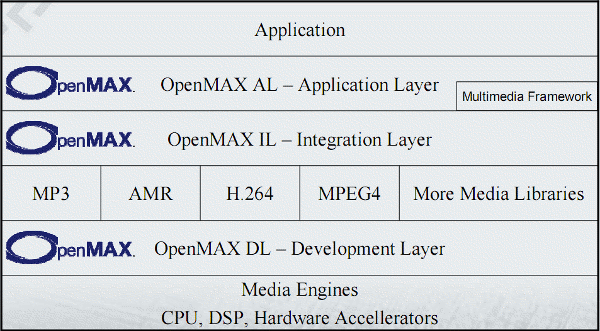After collaborating with arowboat, android-porting and Linaro communities, Texas Instruments has released Android 4.0.3 development kits for Sitara microprocessors which support Beagleboard-XM (Sitara DM3730) and Beaglebone (Sitara AM335x) low cost development boards, as well as other Sitara-based evaluation modules and development boards. Android 4.0.3 Devkit for Beaglebone If you have a Beaglebone (and an LCD or DVI-D cape), you can use TI Android ICS 4.0.3 DevKit v3.0.1, a release providing an Android ICS 4.0.3 distribution for TI’s Sitara AM335x ARM Cortex A8 Processors. This DevKit provides Android sources with pre-integrated SGX (3D graphics accelerator) drivers, TI hardware abstraction for Audio, WLAN & Bluetooth for TI WL1271 chipset, USB mass storage, etc, as well as development and debugging tools such as a toolchain, TI CCSv5, ADT plugins and more, which are provided to build custom Android solutions for the embedded market more easily. The pre-built images includes Android default apps, multimedia […]
Mentor Embedded Linux Kits for BeagleBoard and PandaBoard
Mentor Embedded has recently released free Linux Kits for the BeagleBoard (TI OMAP3) and Pandaboard (TI OMAP4) low cost development boards. Both Mentor Embedded Linux (MEL) kits include: Mentor Embedded Linux Lite, a pre-built Yocto-based distribution, including libraries and headers A Linux Board Support Package (BSP) for your reference board A pre-built filesystem for the target Sourcery CodeBench Lite for application development Installation / Application Development Guides Since Mentor Embedded provides the “Lite” version of their kits, some of the tools mentioned in the diagram above (e.g. Codebench IDE, System Analyzer…) are not available in the free kits. After free registration, you can download the 2 kits on Mentor Embedded website: PandaBoard Linux Kit BeagleBoard Linux Kit and you’ll have access to 3 downloads: Mentor Embedded Linux Kit Installer Quick Start guides Source files which are optional. You can get support for the kits via Mentor Embedded Linux mailing list. […]
The Past, Present and Future of Ubuntu for ARM
David Mandala of Canonical talked at Linux.Conf.Au on 18th of January 2012 about Ubuntu for ARM and the move from netbook to server support. You can read my notes below, or jump at the end of this post to watch the presentation. The Past 2008: Ubuntu decides to only support ARMv7 architecture vs. Debian that supports ARMv4 and above. 2009: Ubuntu release for Freescale i.MX51 (ARMv5 built), and then Marvell ARMAVA with ARMv6 and VFP (ARM floating point unit) support. 2010: April (10.04) The first ARMv7 release for OMAP3 (Beagleboard) with VFP, Thunb2, NEON and SMP for ARM and first netbook edition October (10.10) Pandabord (OMAP4) release with initial device tree support for ARM. Starts work with Linaro. 2011: 11.04 (5th release) – Supports OMAP3 and OMAP4 only. The netbook edition is using Qt, further improvement to device tree, further work with linaro and on the way to the Unified […]
Linaro 11.12 Release with Kernel 3.1.5
Linaro has just released version 11.12 based on Linux Kernel 3.1.5 and further support for Android 4.0 including graphics hardware acceleration on Snowball and Origen development boards. Here are the highlights of the release: Android Linaro ICS is built with the Linaro toolchain. Linaro ICS is running on all supported boards. DS-5 with Gator is supported in all Linaro Andoid ICS builds. The latest version of libpng (1.5.7) has been integrated in Linaro ICS. An AOSP master build is now available from linaro. ARM® Mali™ Hardware Accelerated Graphics is supported on Origen and Snowball. libjpeg-turbo has been integrated into all Andoid ICS builds. Developer Platform The linux-linaro and lt-panda kernel packages are now automatically generated by the CI build scripts DS-5 with Gator is supported in all Ubuntu LEB builds. XBMC packages, with Gstreamer and OpenGLES support, are now available at the Ubuntu Overlay (supporting only Panda initially) U-Boot-Linaro is […]
Android 4.0 on BeagleBoard and Beagleboard-xM
Sola has written the instructions (in Japanese) to build Android 4.0 (ICS) for Beagleboard and Beagleboard-xM. Here’s the same in English: Get the source code: $ mkdir -p /home/sola/work/ics $ cd /home/sola/work/ics $ export ANDROID_ROOT=$PWD $ repo init -u https://bitbucket.org/sola/android_manifest $ repo sync -j8 Build Android: $ cd $ANDROID_ROOT $ source build/envsetup.sh $ lunch full_beagleboard_xm-eng [for BeagleBoard-xM] $ lunch full_beagleboard-eng [for BeagleBoard] $ time make -j8 Generate the rootfs: $ cd $ANDROID_ROOT/out/target/product/beagleboard_xm/ [for BeagleBoard-xM] $ cd $ANDROID_ROOT/out/target/product/beagleboard/ [for BeagleBoard] $ mkdir rootfs $ sudo cp -a ./root/* ./rootfs/ $ sudo cp -a ./system/* ./rootfs/system/ Build the kernel: $ export ARCH=arm $ export CROSS_COMPILE=$ANDROID_ROOT/prebuilt/linux-x86/toolchain/arm-eabi-4.4.3/bin/arm-eabi- $ cd $ANDROID_ROOT/board/beagleboard/kernel $ make omap3_beagle_android_defconfig $ make uImage modules -j8 Partition the SD card (bootloader, media, rootfs): $ cd $ANDROID_ROOT/board/beagleboard/sdcard $ sudo LANG=C ./mksdcard_beagle.sh /dev/sdx where /dev/sdx depends on your setup (e.g. /dev/sda). Generate boot.scr: $ cd $ANDROID_ROOT/board/beagleboard/bootscript $ ./mkbootscr Copy MLO/u-boot.bin/uImage/rootfs to the SD card: […]
OpenMAX (Open Media Acceleration)
OpenMAX (Open Media Acceleration) is a royalty-free, cross-platform set of C-language programming interfaces that provides abstractions for routines especially useful for audio, video, and still images. OpenMAX standard is managed by the non-profit technology consortium Khronos Group. OpenMAX allows developers to take advantages of hardware media decoding/encoding. For example, If you want to play video using Raspberry Pi hardware (VideoCore IV GPU in Broadcom BCM2835) you’ll have to use OpenMAX IL. OpenMAX provides three layers of interfaces: Application Layer (AL): Open standard for accelerating the capture, and presentation of audio, video, and images in multimedia applications on embedded and mobile devices. Integration Layer (IL) : API defining a standardized media component interface to enable developers and platform providers to integrate and communicate with multimedia codecs implemented in hardware or software. Development Layer (DL): APIs containing a comprehensive set of audio, video and imaging functions that can be implemented and optimized […]
Linaro’s Android Platform – ELCE 2011
Zach Pfeffer, Linaro Android Platform team leader, describes Linaro’s work on the Android platform and future plans at Embedded Linux Conference Europe 2011. Abstract: Linaro uses components from the Android Open Source Project, member companies, community supported efforts and Linaro engineering teams to build integrated, easy-to-use and well tested Android platforms for upstream work, product baselines and hobby projects. The team currently has platforms for TIs PandaBoard, BeagleBoard and Beagle xM, ST Ericsson’s Snowball, Samsung’s Origen and Freescale’s iMX53. They recently released platforms with Android 2.3.4 built against GCC 4.6 and running the 3.0 Linux kernel. In this session Zach reviews what’s been done, the Linaro Android concept, how Linaro brings Android together and what their plans are. Jean-Luc Aufranc (CNXSoft)Jean-Luc started CNX Software in 2010 as a part-time endeavor, before quitting his job as a software engineering manager, and starting to write daily news, and reviews full time later […]
Linaro 11.10 Release with Linux Kernel 3.1
Linaro has just released version 11.10 based on Linux Kernel 3.1. Here are the highlights of the release: Android Audio playback and recording works on LEB-panda. TJBench into all Android builds benchmarked against the original Android libjpeg implementation: TomGall/LibJpegTurbo All strict-aliasing violations in 2.3.5 have been fixed and sent to AOSP. (for build optimization) Linaro Gerrit is integrated with Android Build Service for change verification as part of Continuous Integration effort. Tip toolchain tracked and released against all targets for 11.10. iMX53 will now boot with a 3.0 or later Android Kernel. The multimedia test application has been extended to cover encoding and give better benchmark results. Linaro’s Android distribution can now base builds off a tip toolchain build. Linaro’s 11.09 toolchain has been benchmarked. USB camera (UVC) now works on linaro-android builds. Developer Platform The Linux Linaro packages are now generated and validated in a continuous integration loop. New […]







